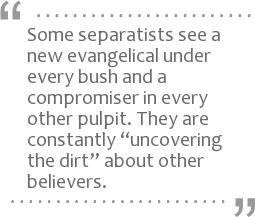Wednesday Morning: Mark Dever -- "The Sufficiency of the Bible about the Local Church"
After singing “How Firm a Foundation” and listening to another testimony from Jamie, a Bostonian who is a pastoral intern at Dever’s church, Mark was given the pulpit. These notes are not a transcript but highlights of the message from my perspective.
Introduction:
 Republished with permission from
Republished with permission from 
 Several bloggers have recently addressed the subject of separation, suggesting that current leaders such as Kevin Bauder, Dave Doran, and Tim Jordan are moving to a position that contradicts the teaching of an earlier generation of fundamentalists.
Several bloggers have recently addressed the subject of separation, suggesting that current leaders such as Kevin Bauder, Dave Doran, and Tim Jordan are moving to a position that contradicts the teaching of an earlier generation of fundamentalists.
Discussion